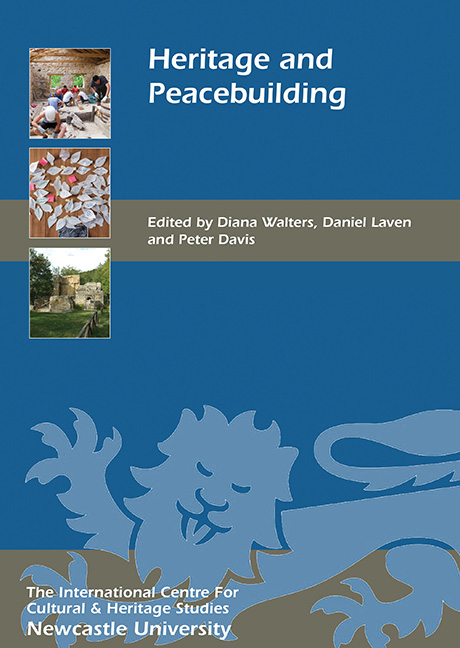Introduction
Published online by Cambridge University Press: 16 February 2018
Summary
This is a hopeful book that seeks to address the imbalance of academic and theoretical considerations of heritage by focusing on areas where it is possible to show contributions towards peacebuilding. At its core is a belief that heritage can provide solutions and that much work is being done in this area internationally to ‘solutionise’ heritage rather than ‘problematise’ it. In these troubled times it may seem almost futile to talk of peace. A global crisis of migration and refugees from war in many parts of the world brings daily images of the impact of conflict, poverty, corruption and intolerance. Within Europe the cooperation of the European Union seems increasingly fragile and the impact of the UK's vote to leave in 2016 is, at least in part, symptomatic of associated identity politics and a turning inwards of individuals, communities and nations. In many cases, fear, distrust or even attacks upon ‘others’ appeal to a sense of heritage for justification; ‘our’ borders, ‘our’ heritage, ‘our’ identity are appropriated to serve specific and, increasingly, violent agendas. At the time of writing it is difficult to overstate the urgency of the question that lies at the heart of this book: how can heritage contribute to peacebuilding?
The issue of conflict is often examined in relation to heritage (see, for example, Sather-Wagstaff 2011; Logan and Reeves 2009; Gegner and Ziino 2012), but the contribution heritage brings to peacebuilding has been largely ignored. Where the relationship between heritage and peacebuilding is discussed in the literature, heritage is often reduced to simply a way of encouraging community-based initiatives that have limited impact on creating conditions for sustainable change. This view implies that such ‘bottom-up’ discourse and practice has less value than examinations of heritage rooted in official approaches to management or academic and theoretical frameworks.
Divisions between ‘bottom-up’ and ‘top-down’ approaches mean that the very real contributions of community-based heritage initiatives to peacebuilding have not received the serious attention that they merit. This debate is to some extent mirrored in wider approaches to contemporary peacebuilding, where top-down initiatives are regarded more seriously, even though a growing body of evidence and experience points to their frequent failures to build lasting peace.
- Type
- Chapter
- Information
- Heritage and Peacebuilding , pp. 1 - 4Publisher: Boydell & BrewerPrint publication year: 2017



